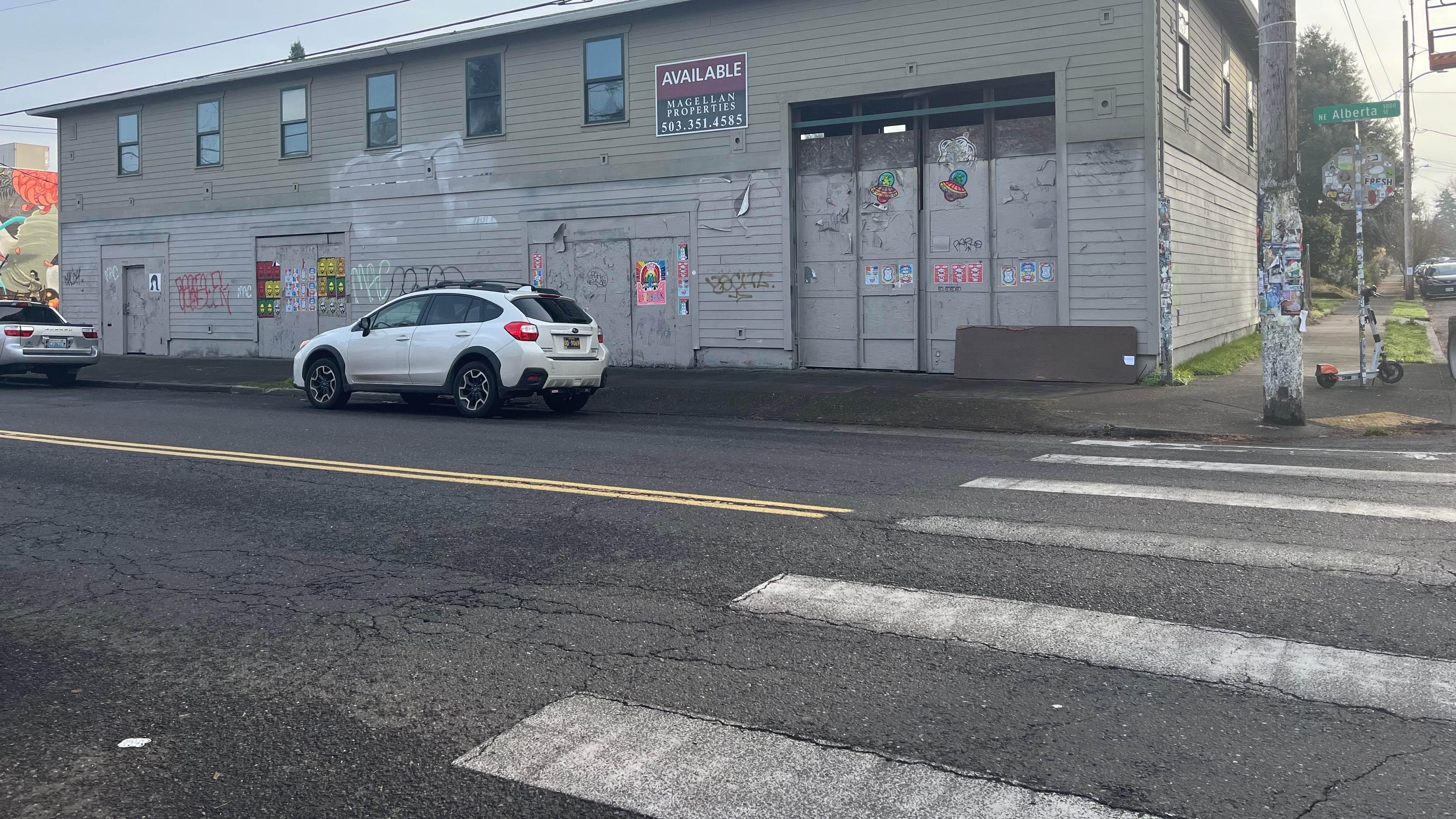- ADDRESS: 2812 NE Alberta St.
- YEAR BUILT: 1907
- SQUARE FOOTAGE: 3,700
- MARKET VALUE: $1.1 million
- OWNER: Alberta Investment Group LLC
- HOW LONG IT’S BEEN EMPTY: Since at least 2019
- WHY IT’S EMPTY: A-Mar Electric Inc. moved out.
It’s hard to miss the huge building at Northeast 28th Avenue and Alberta Street. It’s two stories tall and looks like a 1960s ranch house that ate fast food for 30 years, washed it down with handles of vodka, and became bloated and stricken with gout.
There are windows on the second floor that suggest apartments. But there are no apartments. The whole structure is a cheap façade covering the remains of an old electrical shop owned until recently by Greg Martin, once a powerful union electrician who prospered by supervising work by the International Brotherhood of Electrical Workers at Portland shipyards. Until 2007, the building was all plywood: Sheets of the stuff ran for a half a block along Alberta. Martin put up the cheap siding and windows to make it look less like a Berlin Wall of wood.
After Martin, now 82, left the business, and the building, a man with a long arrest record named Alasdair MacDonald moved in. First onto the property and then into a tent and car in the alley on the east side of the building. MacDonald spent his days obsessively painting the Potemkin façade, adorning his work with pictures clipped from magazines.
It was while MacDonald was living there that WW first examined the building two years ago (“The Alberta Collection,” Sept. 7, 2022).
MacDonald became famous in August when he was the first person arrested under Portland’s new camping rules, which allow tent dwelling only when no shelter beds are available. Former Mayor Sam Adams, then running for Multnomah County commissioner on a tough-on-camping platform, mentioned MacDonald often, including at WW’s endorsement interview, describing how MacDonald had lived there for six years and refused to move along after multiple warnings. Therefore, Adams said, it was proper to arrest him.
Years after a “for sale” sign went up, the building has a new owner. Luca Gorman, a local developer, did what so many had tried: He got Martin, the aged electrician, to sell last year for $1.2 million, a transaction that has yet to be reported (we’ve been busy here at Chasing Ghosts!). Gorman bought the building through Alberta Investment Group LLC, an entity he controls.
In September, Adams arrived at the building looking to interview Gorman for his online campaign show Out and About with Sam about dealing with MacDonald. Gorman didn’t recognize Adams, who had a few days of gray stubble and wore a baggy blue shirt.
“I thought, oh great, another homeless guy on my property,” Gorman says.
The two talked about homelessness and how Gorman had to spend thousands of dollars to remove MacDonald’s hoard of stuff, which had piled up over the years. Gorman also had to pay $400,000 in liens by the city, slapped on the old owner for the mess.
So what’s going on with the property now? Gorman has removed MacDonald’s camp, an old forklift, and a small fleet of derelict cars filled with trash. The alley is clear, and MacDonald is gone. (His whereabouts are unknown; his last arrest was the one in August.) But the “for sale” sign is still up and no demolition has begun.
That’s in part because another electrician, Martin’s son, Rasta K. Walid (given name: Greg Martin Jr.) turned up in August and sued Gorman, his company, and two dozen other entities in U.S. District Court in Oregon for allegedly interfering with a 1993 contract (seemingly authentic and produced in the court record) under which his father agreed to pay him $7.5 million for electrical work from 1985 to 2019.
Walid says Gorman and a group of conspirators forged his father’s signature to wrest control of three properties that Gorman has purchased from Martin over the years, including the one on Alberta. Those sales were improper because Martin had pledged the properties to his son in the 1993 agreement. In short, Walid says, Gorman cheated a sick old man out of his real estate holdings and denied Walid his inheritance.
“In 2019, the properties were supposed to be turned over to me,” Walid says in an interview.
Gorman denies any wrongdoing. “He sued me, he sued everyone,” Gorman says. “It was a big money grab.”
The suit soaked up time and money for Gorman, and other projects became more pressing. Gorman had planned to build an indoor food hall and brewery in the space, but the building isn’t permitted for that, another cost on top of what he has already spent. He’s thinking about retail and is in the market for a partner.
So, for now, the old plywood palace on Alberta is cleaned up but empty. Some of MacDonald’s artwork remains, along with the inevitable graffiti.

